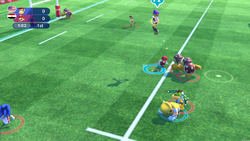Rugby Sevens (Mario & Sonic at the Olympic Games Tokyo 2020)
| Rugby Sevens | |
|---|---|

| |
| Appears in | Mario & Sonic at the Olympic Games Tokyo 2020 |
| Circuits | Chapter 15: Cheer Power |
| Entry characters | All regular characters plus Diddy Kong, Boom Booms and Egg Pawns |
Rugby Sevens is an event in Mario & Sonic at the Olympic Games Tokyo 2020 where the goal is to win a match between two teams. Only non-motion controls are available.
Compared to Rugby Sevens in Mario & Sonic at the Rio 2016 Olympic Games for the Wii U, the camera angle now goes left-right instead of forwards-backwards. As in the previous iteration the player can choose between Boom Booms and Egg Pawns to fill the three remaining defensive spots in the lineup.
Rules[edit]
The core rules of the sport are adhered to. There are five points for a try, two points for a post-try conversion, and three points for a drop goal between the upper posts while the ball is live. Players must place down the ball manually in the try zone wherever they want, with the potential of trying to place the ball closer to the center of the try zone to get a better position for the resulting conversion kick.
There are no penalties, penalty tries or free kicks. While kicking free kicks out of bounds for a lineout, during which circumstances the team that kicked it out gets to throw the lineout, is extremely common in rugby sevens in real life, such a strategy is not available at all in this game.
The options for the event can set the length of the match's regulation time to two, three or four minutes.
While real-life rugby sevens will generally only blow the whistle at the end of a half after the ball has gone out of bounds, if a drop goal is scored or after a post-try conversion attempt, Mario & Sonic at the Olympic Games Tokyo 2020 can end halves while the ball is still live if no interruptions of play have occurred after time ran out.
Gameplay[edit]
As in real life the team that is starting the half or which most recently scored, will kick the ball into the receiving team's defense to make the ball live.
Players who have the ball can attempt to pass it backwards or lateral, kick it forwards, and jump over opponents who try to tackle them, but the player will get dramatically slower the longer the same player holds on to the ball.
If a try has been scored, the conversion is attempted by pressing near the middle of a half-circle slider that goes from side to side. The kicker has approximately nine and a half seconds to kick the ball, after which the slider locks on at hard left or hard right and the kick goes far wide.
Scrums occur occasionally and ones with one or two players from each time are contested on the spot. If there is a two-on-one scrum, the team with two players in it will always regain the ball. On rare occasions, a three-on-three scrum occur after an interruption of play.
If a team player's rainbow energy meter has filled up, the player can attempt a Super Dash (if they have the ball) or a Super Tackle (if anyone on the other team has the ball). A Super Tackle can stop an opponent's Super Dash if done with good timing.
Controls[edit]
| Action | Controls | ( |
|---|---|---|
| Move | ||
| Change active player | ||
| Catch ball during a lineout | ||
| Contest a three-on-three scrum | Mash | |
Offense[edit]
| Action | Controls | ( |
|---|---|---|
| Pass | ||
| Place down the ball for a try | ||
| Jump ("Evade Tackle") | ||
| Kick ball | ||
| Drop kick | Hold |
Hold |
| Super Dash | ||
Defense[edit]
| Action | Controls | ( |
|---|---|---|
| Tackle | ||
| Super Tackle | ||